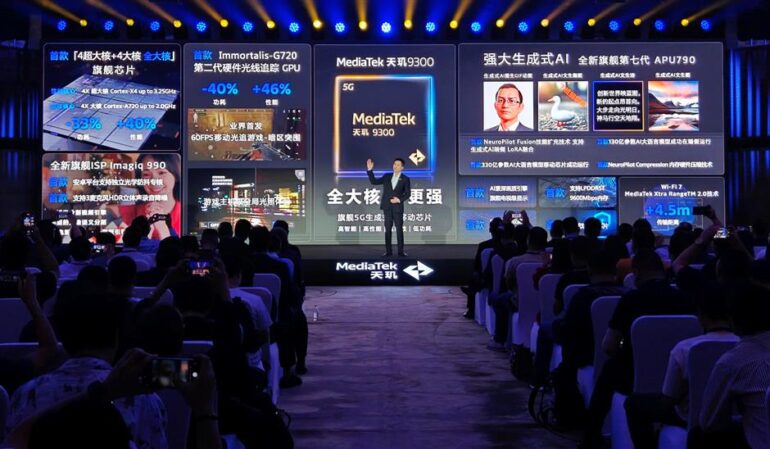TL;DR:
- Vivo launches X100 smartphone with on-device generative AI capabilities.
- Introduces AI sub-brands, covering AI chip, battery, LLM, and image chip.
- X100 and X100 Pro models feature on-device LLM with 7.0 billion data.
- Vivo’s AI offers ChatGPT-like services, including smart assistants and content generation.
- Powered by Dimensity 9300, a next-gen AI chip by MediaTek.
- Vivo’s BlueLM promises to revolutionize the smart technology ecosystem.
- The market is expected to rebound as AI ushers in a new era.
- Collaboration with ZEISS enhances smartphone photography.
- X100 and X100 Pro are available starting November 21.
Main AI News:
Vivo, a leading player in the global smartphone market with over 500 million users, has officially launched the X100 smartphone, marking a pivotal moment in the tech industry’s history. This remarkable device boasts on-device generative artificial intelligence capabilities, setting a new standard for innovation and performance.
The X100 Series debut also introduced Vivo’s AI sub-brands, encompassing AI chips, batteries, large language models (LLM), and image chips. These elements converge to deliver a seamless and intelligent user experience.
The X100 and X100 Pro models incorporate on-device LLM with a staggering 7.0 billion data points, a milestone unparalleled in the mobile world. Additionally, Vivo’s LLM, equipped with an impressive peak of 13 billion data points in online connections, empowers users with ChatGPT-like services. These services encompass smart assistants, generative content production, and image generation, elevating the smartphone experience to unprecedented heights.
ChatGPT, a chat generative pre-trained transformer, represents the pinnacle of LLM-based chatbots, developed by OpenAI. Vivo’s integration of such advanced technology signals a bold leap into the future of mobile innovation.
According to Huang Tao, Vice President of Product at Vivo, AI has ushered the smartphone industry into an exciting new era. With its massive user base and commitment to AI, Vivo is poised to exert a profound influence on the market in the years to come.
Powering this groundbreaking device is the Dimensity 9300, a mobile processor developed by MediaTek. The X100 marks the processor’s debut and is heralded as the next-generation AI chip for mobile devices.
Chen Guanzhou, General Manager of MediaTek, highlights the transformative potential of Dimensity 9300, stating, “It promotes the popularization of generative AI innovation applications, so that cutting-edge technology benefits a wider range of people and empowers thousands of industries.” This processor delivers up to two times the performance of previous-generation chips in integer and floating-point operations, all while consuming up to 45 percent less power. Its built-in hardware-grade generative AI engine enables faster and safer edge AI computation, solidifying MediaTek’s reputation as a pioneer in the semiconductor industry.
Qualcomm, a prominent U.S.-based mobile chip designer, has also ventured into generative AI development. Although they have demonstrated Stable Diffusion technology in mobile devices, their final consumer products have yet to hit the market.
Vivo’s BlueLM, the latest addition to their AI LLM lineup, is poised to revolutionize the smart technology ecosystem. It promises to set new industry standards, enhance user experiences, and pave the way for more potent AI applications.
Industry insiders believe that the timing of Vivo’s “AI smartphone” launch couldn’t be better, as the market is expected to rebound. While the Chinese smartphone market saw a modest decline in the third quarter of this year, experts predict it will bottom out in 2023 and experience a swift resurgence, as stated by the International Data Corp.
Furthermore, Vivo’s new X100 features ZEISS technology, the result of an upgraded collaboration announced during the 6th China International Import Expo in Shanghai. This partnership enhances the smartphone’s photography capabilities, particularly in chromatic aberration control and color correction, bringing it closer to professional camera quality.
The rapid transition from exhibition to product highlights the spillover effect of the CIIE, showcasing the agility of the tech industry.
Vivo enthusiasts can mark their calendars, as the X100 and X100 Pro are set to go on sale on November 21, with prices ranging from 3,999 yuan (US$555) to 5,999 yuan.
Conclusion:
Vivo’s X100 Series marks a significant leap in the AI smartphone industry. With unmatched on-device AI capabilities, strategic sub-brand expansion, and collaboration with MediaTek and ZEISS, Vivo is well-positioned to shape the future of mobile technology. As the market is projected to rebound, Vivo’s innovation will likely have a profound impact on the industry, setting new standards for user experiences and AI integration in smartphones.

